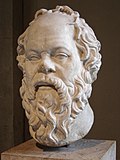German philosophy, meaning philosophy in the German language or philosophy by German people, in its diversity, is fundamental for both the analytic and...
58 KB (6,742 words) - 23:35, 27 April 2024
(2002). German Idealism: The Struggle Against Subjectivism, 1781–1801. Vol. Part I. Harvard University Press. Pinkard, Terry (2002). German Philosophy 1760–1860:...
18 KB (2,245 words) - 01:19, 23 February 2024
world). German philosophy exercised broad influence in this century, owing in part to the dominance of the German university system. German idealists...
93 KB (11,340 words) - 05:40, 14 April 2024
"Ugliness", Encyclopedia of Philosophy (McMillan, 1973). Monroe C. Beardsley, "History of Aesthetics", Encyclopedia of Philosophy, Volume 1, p. 20 (Macmillan...
31 KB (4,195 words) - 19:41, 2 May 2024
Philosophy (φιλοσοφία, 'love of wisdom', in Ancient Greek) is a systematic study of general and fundamental questions concerning topics like existence...
214 KB (18,379 words) - 15:36, 30 April 2024
reflection rather than exclusively empirical inquiry. Continental philosophy includes German idealism, phenomenology, existentialism (and its antecedents,...
29 KB (3,362 words) - 04:07, 22 May 2024
The history of philosophy is the systematic study of the development of philosophical thought. It focuses on philosophy as rational inquiry based on argumentation...
209 KB (21,451 words) - 01:24, 5 April 2024
(disambiguation) Ultimate reality Universality (philosophy) Tian Tao Wusheng Laomu Hegel capitalized das Absolute because German grammar requires this of all nouns...
10 KB (1,146 words) - 05:38, 25 April 2024
physics bore the title Treatise on Natural Philosophy (1867). In the German tradition, Naturphilosophie (philosophy of nature) persisted into the 18th and...
35 KB (4,509 words) - 08:56, 2 April 2024
Analytic philosophy is a broad, contemporary movement or tradition within Western philosophy and especially anglophone philosophy, focused on analysis...
94 KB (10,819 words) - 15:38, 22 May 2024
(Macmillan) List of Germans List of German journalists List of German-language poets List of German-language authors German philosophy List of philosophers...
15 KB (1,628 words) - 18:08, 12 April 2024
Georg Wilhelm Friedrich Hegel (redirect from Hegelian philosophy)
November 1831) was a German philosopher and one of the most influential figures of German idealism and 19th-century philosophy. His influence extends...
149 KB (18,923 words) - 00:51, 18 May 2024
Contemporary philosophy is the present period in the history of Western philosophy beginning at the early 20th century with the increasing professionalization...
36 KB (4,191 words) - 19:32, 16 March 2024
19th centuries, influencing philosophy, aesthetics, literature, and criticism. Compared to English Romanticism, the German variety developed relatively...
13 KB (1,412 words) - 20:24, 21 April 2024
Canadian philosophy Czech philosophy Danish philosophy Dutch philosophy French philosophy Greek philosophy German philosophy Italian philosophy Maltese...
33 KB (3,075 words) - 13:26, 1 May 2024
The German Ideology (German: Die deutsche Ideologie), also known as A Critique of the German Ideology, is a set of manuscripts written by Karl Marx and...
10 KB (1,293 words) - 17:41, 4 April 2024
human beings, as he and Engels said in The German Ideology (1846): In direct contrast to German philosophy, which descends from heaven to earth, here...
40 KB (5,619 words) - 17:50, 16 April 2024
the preparation of German Romanticism." The philosophy of Fichte was of pivotal importance for the Romantics. The founder of German Romanticism, Friedrich...
23 KB (2,607 words) - 19:47, 2 May 2024
Eastern philosophy or Asian philosophy includes the various philosophies that originated in East and South Asia, including Chinese philosophy, Japanese...
84 KB (9,516 words) - 03:25, 1 May 2024
Volk (redirect from Volk (German))
English-language context, the German word is of interest primarily for its use in German philosophy, as in Volksseele ("national soul"), and in German nationalism – notably...
24 KB (2,839 words) - 06:45, 16 April 2024
- Geography, philosophy of - German idealism - German philosophy - Gnosticism - Greek philosophy - Healthcare, philosophy of - Hedonism - Hegelianism -...
12 KB (758 words) - 00:31, 9 April 2024
Kantianism (redirect from Philosophy of Kant)
Kantianism (German: Kantianismus) is the philosophy of Immanuel Kant, a German philosopher born in Königsberg, Prussia (now Kaliningrad, Russia). The term...
9 KB (962 words) - 01:39, 30 December 2023
Naturphilosophie (redirect from Nature-philosophy)
Naturphilosophie (German for "nature-philosophy") is a term used in English-language philosophy to identify a current in the philosophical tradition of German idealism...
18 KB (2,173 words) - 18:18, 30 April 2024
Lebensphilosophie (redirect from Philosophy of life)
Lebensphilosophie (German: [ˈleːbm̩s.filozoˌfiː]; meaning 'philosophy of life') was a dominant philosophical movement of German-speaking countries in the...
9 KB (842 words) - 02:26, 27 March 2024
Neo-Kantianism (redirect from Neo-Kantian philosophy)
In late modern continental philosophy, neo-Kantianism (German: Neukantianismus) was a revival of the 18th-century philosophy of Immanuel Kant. The neo-Kantians...
13 KB (1,502 words) - 19:39, 6 May 2024
Idealism (redirect from Idealism (philosophy))
Idealism in philosophy, also known as philosophical idealism or metaphysical idealism, is the set of metaphysical perspectives asserting that, most fundamentally...
112 KB (14,614 words) - 16:44, 17 May 2024
Geist (redirect from Geist (philosophy))
Geist (German pronunciation: [ˈɡaɪst] ) is a German noun with a significant degree of importance in German philosophy. Geist can be roughly translated...
23 KB (2,740 words) - 23:52, 1 April 2024
God is dead (category German philosophy)
"God is dead" (German: Gott ist tot [ɡɔt ɪst toːt] ; also known as the death of God) is a statement made by the German philosopher Friedrich Nietzsche...
21 KB (2,808 words) - 02:53, 18 May 2024
Art of Archery (Zen in der Kunst des Bogenschießens) is a book by German philosophy professor Eugen Herrigel, published in 1948, about his experiences...
6 KB (761 words) - 06:52, 3 May 2024
Philosophical skepticism (redirect from Scepticism (philosophy))
E. Schulze gave rise to a robust discussion of skepticism in German idealistic philosophy, especially by Hegel. Kant's idea was that the real world (the...
77 KB (9,838 words) - 14:03, 1 April 2024












